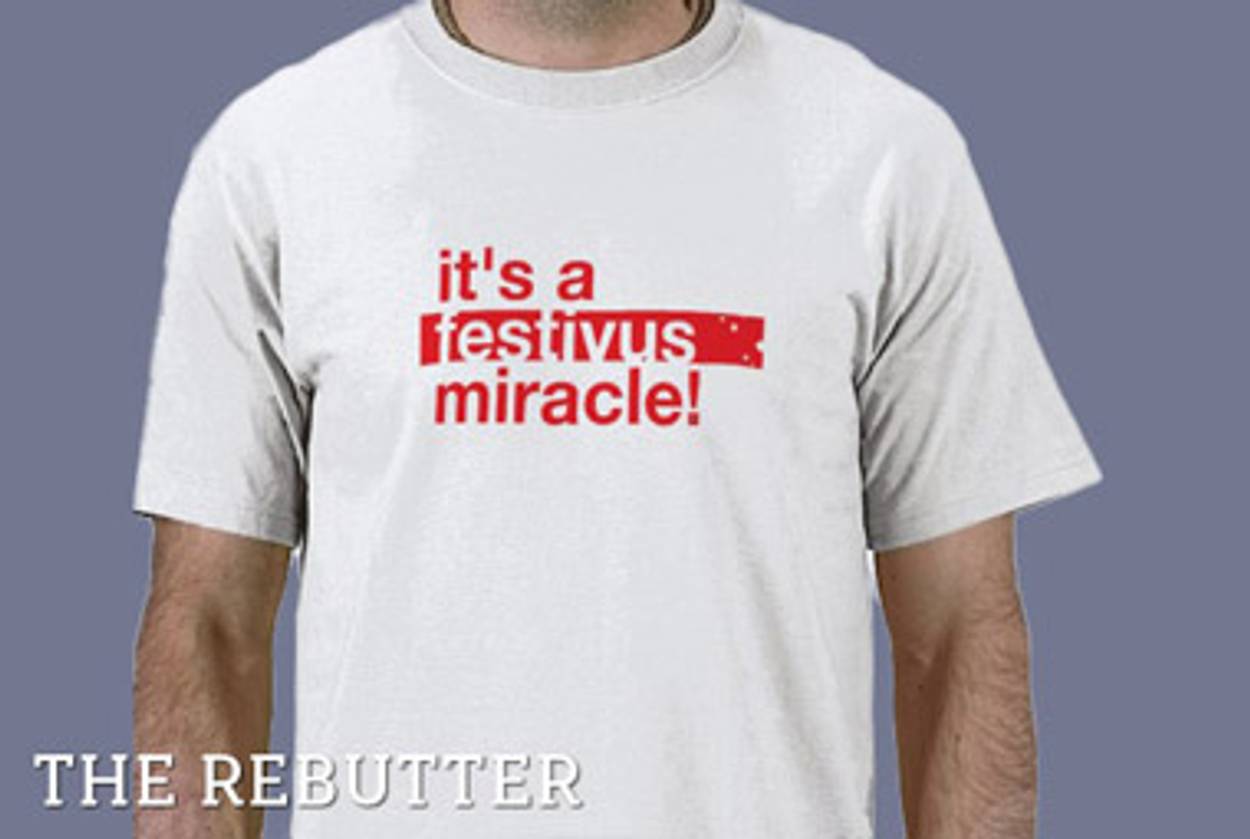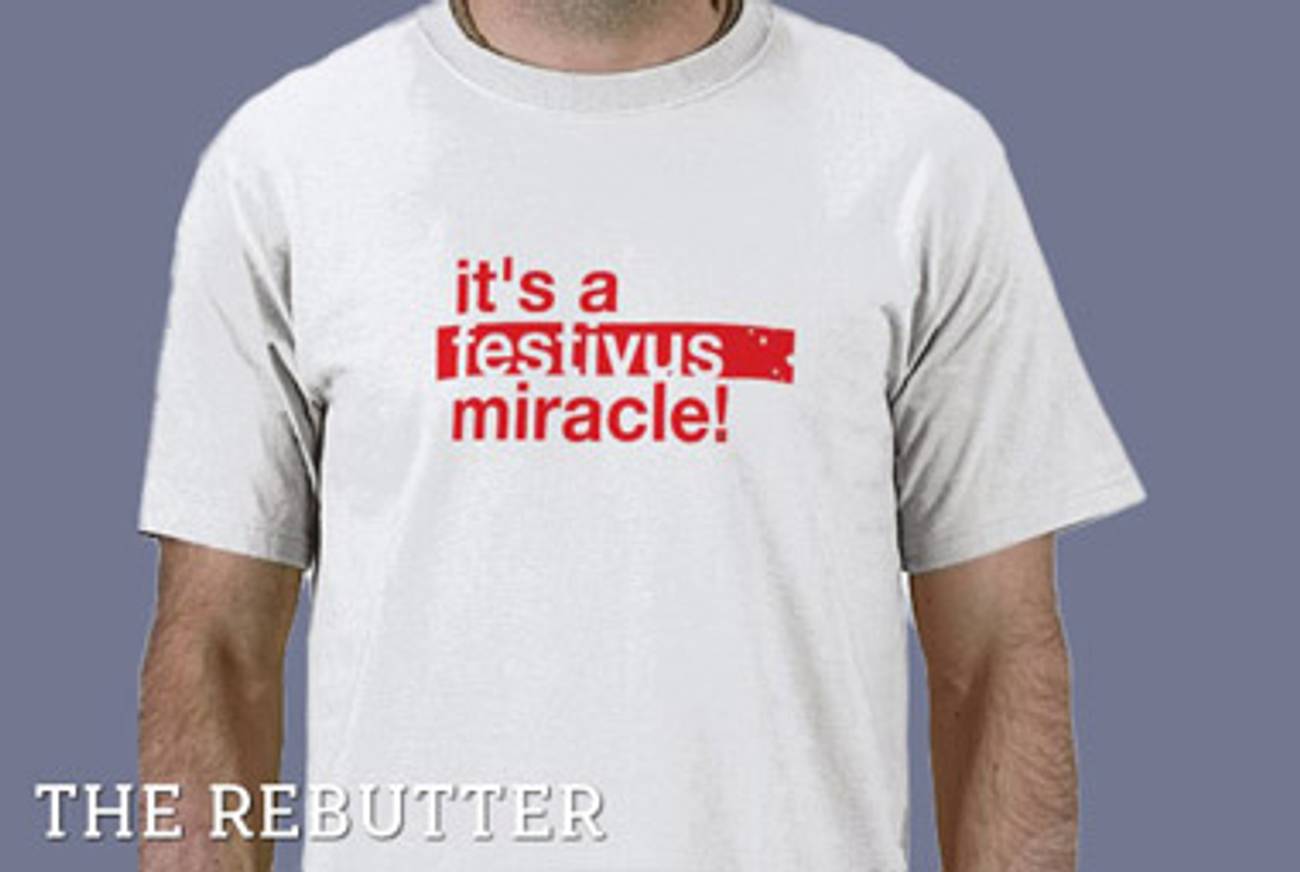In Defensivus of Festivus
The Rebutter




Senior writer Liel Leibovitz’s weekly “The Arbiter” column tends to attract its share of disagreement and general verklempt-ness among staffers and readers alike for the evident joy with which this self-appointed Moses sets about smashing so many Jewish cultural idols (and, other times, worshipping Jewish cultural artifacts that most would be happy to relegate to the dustbin). “The Rebutter,” an occasional column from contributing editor Rachel Shukert, gives voice to your outrage and, perhaps, puts Liel in his place.
This week Liel has his proverbial latkes in a twist over Festivus, the fictional holiday “for the rest of us” that made its debut in a 1997 Seinfeld episode. In the ensuing years, Festivus celebrations have been sweeping the nation, proselytizing religious nihilism and spreading ironic secularism. Or so Liel claims, although his main piece of evidence to this effect is that Republican House Majority leader Eric Cantor has used it as an occasion for a fundraiser. Also, Christopher Hitchens was an atheist who actively strove to convert others to his particular form of militant disbelief.
I had three separate reactions to this: 1) Of all the things about the state of this country that keep me up at night, worrying about its takeover by a group of self-effacing secular humanists is not one of them; 2) if this is an attempt to paint the otherwise loathsome Cantor as a secularist, thus discrediting him with his conservative constituency, then Liel may actually be onto something; 3) I have to stop the drinking game I invented of taking a drink every time one of Hitchens’s obits mentions his booze intake, because I think I actually can feel my liver ache. I thought that was a myth of Gwyneth Paltrow’s, but I think it might be true.
Basically, Liel’s problem with Festivus is that it celebrates a belief in nothing, and indeed sets up a false dichotomy between passionately (not to mention smugly) believing in nothing and being a fanatical blob of rancid Crisco like Jerry Falwell, with no shades of gray in between—a lack of nuance and/or flexibility that he claims is profoundly un-Jewish. I don’t necessarily disagree with him, except to point out he’s the one who set up this false dichotomy in the first place (I would also say that this is the second time in as many weeks that he’s called for an increase of nuance in public dialogue while employing precious little of it himself; subtlety, like charity, begins at home). Nor do I agree that the rituals of Festivus are without religious overtones: with its starkly unadorned aluminum pole and its merciless Feats of Strength presided over by a bellowing and irascible father figure who bullies his cowed children into bending to his every arbitrary whim, there’s something deeply Old Testament about the holiday that got the Costanza family run out of Bayside.
But to me, the true meaning of Festivus lies not in the essential meaninglessness of the ritual itself. It’s in “the rest of us.”
Liel, although he’s lived in the States for quite a long time, is Israeli—ninth-generation, as he is fond of reminding us. While we’ve never discussed it specifically, I’m pretty sure his was a childhood free from the tyrannical ubiquity of Christmas and the sense of resentful anxiety it engendered in the typical Jewish-American child. The moral anguish over whether or not to sing the Christmas carols in choir; the art-class spent forlornly making sparkling ornaments for the tree you didn’t have; the horrible afternoon when a well-meaning teacher thought it might be nice for you to demonstrate for the class just exactly what “Jewish people do for your holiday,” a gesture meant to be inclusive, but which only served to highlight your painful sense of difference and the relative paltriness of your tradition against the glittering, pinecone-trimmed splendor of the Yuletide: these are foreign to him.
In America, being a Jewish child on Christmas is like being taken to Disneyland and told that not only were you not allowed to go on any of the rides, you shouldn’t even want to. Nor does the longing to be a part of it necessarily subside when childhood ends. My husband and I have an fight every year about whether or not we can get a tree: I argue that as we are adults and have as yet no children to whom it is our responsibility to adequately alienate from the culture-at-large, we should be able to get one; he counters, quite reasonably, that we don’t celebrate Christmas. There are always tears, and he always wins.
Given all this, it’s little wonder to me that some celebrants of Festivus—if they are truly as widespread as Liel seems to believe—simply want to be able to observe a holiday at the end of the year that leaves no one out: not just the Jewish kids, but the Muslim kids and the Buddhist kids and the Hindu kids and yes, even the atheist and the secular humanist kids. That doesn’t seem nihilistic to me; it seems hopeful. Festivus doesn’t denigrate believers. It levels the playing field by believing in everything—and everyone.
Not bad for a fake holiday that no one celebrates anyway.
Related: About Nothing [Tablet Magazine]
Rachel Shukert is the author of the memoirs Have You No Shame? and Everything Is Going To Be Great,and the novel Starstruck. She is the creator of the Netflix show The Baby-Sitters Club, and a writer on such series as GLOW and Supergirl. Her Twitter feed is @rachelshukert.